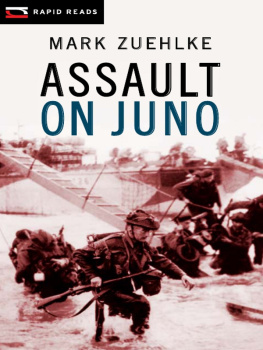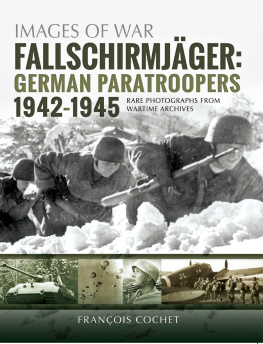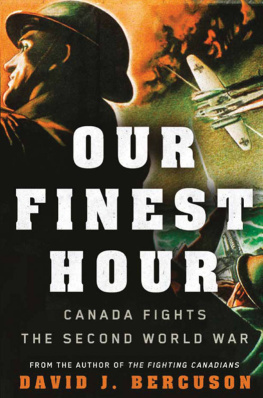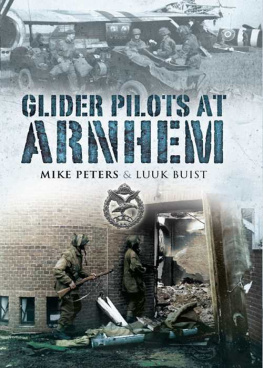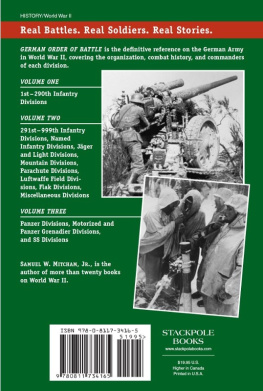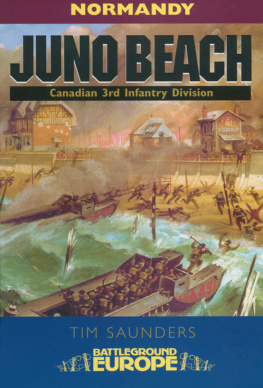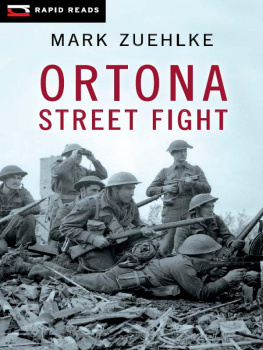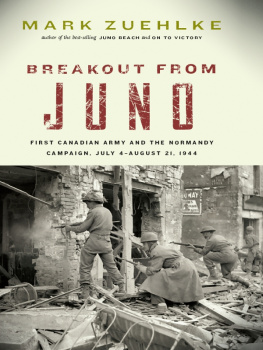ORTONA
ORTONA
CANADAS EPIC WORLD WAR II BATTLE
MARK ZUEHLKE

Copyright 1999 by Mark Zuehlke
First paperback edition 2003
First US edition published in 2004
03 04 05 06 07 5 4 3 2 1
This book was published originally by Stoddart Publishing.
All rights reserved. No part of this book may be reproduced, stored in a retrieval system or transmitted, in any form or by any means, without the prior written consent of the publisher or a licence from The Canadian Copyright Licensing Agency (Access Copyright). For a copyright licence, visit www.accesscopyright.ca or call toll free to 1-800-893-5777.
Douglas & McIntyre
2323 Quebec Street, Suite 201
Vancouver, British Columbia
Canada V5T 4S7
www.douglas-mcintyre.com
National Library of Canada Cataloguing in Publication Data
Zuehlke, Mark
Ortona: Canadas epic World War II battle / Mark Zuehlke.
Includes bibliographical references and index.
ISBN 1-55054-557-4
1. Ortona (Italy), Battle of, 1943. 2. Canada. Canadian Army. Canadian
Infantry Division, 1stHistory. 3. World War, 19391945Regimental histories
Canada. I. Title.
D763.I82O77 2003 940.54215713 2003-910572-5
Library of Congress Cataloging-in-Publication data is available.
Cover design by Peter Cocking
Cover photograph by T. Rowe (NAC, PA-114490)
Part title photo by Sarah Jane English
Interior design and typesetting by Kinetics Design & Illustration
Printed and bound in Canada by Friesens
Printed on acid-free paper
Distributed in the U.S. by Publishers Group West
The publisher gratefully acknowledges the financial support of the Canada Council for the Arts, the British Columbia Arts Council, and the Government of Canada through the Book Publishing Industry Development Program (BPIDP) for its publishing activities.
The next dreadful thing to a battle lost is a battle won.
Arthur Wellesley,
Duke of Wellington
CONTENTS
PREFACE
WRITING a history dedicated exclusively to a single battle fought more than fifty years ago presents an enormous challenge for the modern historical writer. Documentation is often lacking, the physical landscape is changed, the memories of the veterans who survived may be fading, and there are far too few veterans left. Yet that collective veteran memory became the essence of this book.
I was privileged to interview or correspond with many an old soldier, as well as Italian civilian. I was able to access the interviews that Major Michael Boire conducted with German soldiers who fought at Ortona. Each veteran reached into the web of personal memory to pull forth compelling stories, often little more than a snapshot, of a horrific experience. My debt to them all is immense. They are all listed in the bibliography.
There are some historians who argue that the memory of participants in events that have been filtered through the passage of fifty or more years is suspect. They argue that writers should only march down the official record when stating what is or is not a fact. Fact. What a conundrum for a non-fiction writer. Norman Mailer has argued that nothing can be factual that everything is coloured through the eyes of the recorder and therefore no interpretation of events can be called true.
I confronted this problem daily. The war diaries of the battalions featured in this book are rife with errors and sometimes blatant revisionism to protect commanders from just criticism for decisions that led to unnecessary deaths. The official histories are laden with inaccuracies that the war diaries illuminate. Individual soldiers point out errors and omissions in the official record, while the war diaries may contradict both. So where is truth?
To address the problem, I used a somewhat unscientific solution based on gut instinct. I cross-checked where possible. If two or three veterans say the same thing, it seems probable that this is what happened. Sometimes I was forced to consider the middle road between accounts of an event and make decisions, based on terrain and other military factors, to arrive at what likely transpired. Seldom did these decisions contradict the memory of veterans relating the story more than fifty years after the fact. Rather, their memory often corrected the official version.
War, as the esteemed psychologist Abraham Maslow contended, is a peak experience. There are only about three peak experiences possible in Maslows world. They involve a heightening of sensation that transcends the normal flow of life. The experience is so intense that it will never be forgotten. It is not surprising then that the veterans still carry these memories and that some are unable to discuss them at all because they remain so alive to them. For others, the memories are beginning to fade. Many times veterans either wrote or said, I dont remember the details. They often referred to things being a blur. Yet through this fog of time, many incidents were starkly illuminated in their descriptions. The distant gaze in Bert Hoffmeisters eyes, as he described the caked blood on the hands and faces of the wounded in the San Vito hospital, is mute evidence of how vivid such memories remain. When a bullet meant for Jock Gibson only clipped his ear, but struck the young runner behind him in the face, the image of the boys dead body lying on a cobblestone street in San Leonardo stuck. Those are the type of memories reflected in this book. Usually it was not too difficult to verify memories against the official documentation. Often, through interviewing other veterans, I was able to see the same incident through many eyes, and their stories were usually in agreement.
I tried wherever possible to confirm the memory of the veterans with the historical record as contained in the National Archives of Canada, the Directorate of History of the Department of National Defence, the Canadian War Museum, and the published official histories. At times the accounts conflict. For example, George Garbutts experience before Villa Rogatti was completely at odds with that recorded by the war diary and then immortalized in the Princess Patricias Canadian Light Infantry official history. It takes a special courage to point out that the heroism assigned to you never actually occurred and that, in fact, you were in a different part of the battlefield at the time.
Largely, however, I believe the official records are accurate. And mostly the veterans agreed with those records. What the official records often dont include are the mistakes made at every level of command. War is an exercise in confusion. Based mainly on the analysis of veterans, I have tried to capture and reflect the many errors of strategy and tactics that occurred. These men had to bury comrades as a result. So I gave them the last word.
ACKNOWLEDGEMENTS
WHILE researching this book, I was assisted by many helpful staff at the National Archives of Canada and National Library of Canada, the Department of National Defences Directorate of History, the Canadian War Museum reading room, the Canadian Broadcasting Corporations Radio Archives (special thanks to Debbie Lindsey), the City of Edmonton Public Archives, and the University of Victoria Special Collections.
Many people were extremely generous with their time and in sharing resources that helped bring this book to completion. Wayne Langton, whose father died at Ortona while serving with the Saskatoon Light Infantry, was always enthusiastic with his support. Oral historian Ken MacLeod both physically and metaphorically opened doors to interviews with various veterans. Dr. Reginald Roy provided some helpful suggestions of where to look in his papers for information.
Next page

